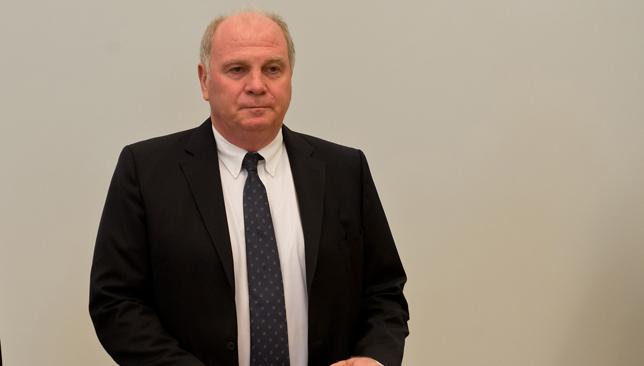
Bayern Munich boss Uli Hoeness faced damaging testimony in a tax trial Tuesday when an official charged the German football legend had withheld incriminating evidence for over a year.
New twists and additional witnesses will likely extend the high-profile trial – in which Hoeness faces a possible jail term – beyond this week, said a court spokeswoman.
Hoeness, 62, in a shock confession told the opening of the trial on Monday that he used Swiss bank accounts to cheat on 18.5 million euros ($25.5 million) in taxes, almost five times the amount prosecutors had assumed.
A rueful Hoeness told the Munich court that he had stashed away the money during years of obsessive stock "gambling", during which he had lost sight of his winnings and losses.
On Tuesday, a tax official testifying in the packed courtroom challenged a claim by Hoeness that he was only able to provide authorities the full 70,000 pages of documents from his bank just two weeks before the start of the trial.
The official said that IT specialists had determined that his bank had sent them as early as January last year.
"This (data) stick was only put together on February 24," the Rosenheim tax office investigator told the court.
"However, the data on it was created on January 18, 2013 … This was determined by our IT colleagues," she added.
The testimony piled further pressure on Hoeness, one of the best known figures in German football, whose tax troubles have often been front-page news since the scandal broke last year.
Hoeness has spent more than four decades with the Bavarian sporting giants – first as player, when he helped then West Germany win the 1974 World Cup, then as team manager and, since 2009, as club president.
He has stayed on so far at the helm of the European champions club amid pleas of loyalty from fans and players, and from corporate sponsors such as Adidas, Audi, VW and Deutsche Telekom.
However, the public mood has darkened, with wider condemnation of German super-rich tax cheats who hide their money in secret accounts abroad rather than pay their fair share for roads, schools and hospitals at home.
Munich daily Sueddeutsche Zeitung charged that when Hoeness first turned himself in to authorities in January 2013 – at a time when journalists had started to aggressively investigate his case – he had only told a half-truth.
"His self-reporting was like a shiny soap bubble," the newspaper said.
"It suggested Hoeness had decided to come clean. But it wasn't so. Hoeness, more specifically his lawyer, knew the bubble would burst. That's why they have now pricked it themselves."
Prosecutors have argued that Hoeness' initial revelation of his Zurich accounts contained irregularities and would not offer him immunity because authorities already had Hoeness in their crosshairs at the time.
The maximum punishment for major tax fraud under German law is 10 years jail, although sentences are usually shorter and can be suspended.
Another newspaper, the Flensburger Tageblatt from northern Germany, pointed out that a possible guilty verdict would resonate far and wide by pushing citizens to rethink the finer details on their tax return.
Since the case first made headlines, the daily said, "it has already triggered a tsunami of self-reporting that has flushed millions into the state coffers."